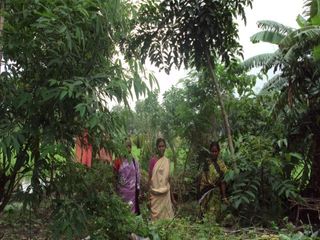Sustainable Livelihoods
Artisan Empowerment
An artisan is a person who uses hand skills and natural resources to earn a sustainable and eco-friendly livelihood. To us however the word points to a whole lifestyle and symbolizes the interdependence between the artisan and the world at large. Because theirs is a grassroots world. Working to help them become unified and strong promotes employment helps women and protects the environment and the diversity of cultures. In a world that is increasingly plastic and standardized, preserving the biodiversity of skills is as critical as preserving the biodiversity of flora and fauna.
'Made by Hand' is 10 minute documentary of the two programmes for artisan support
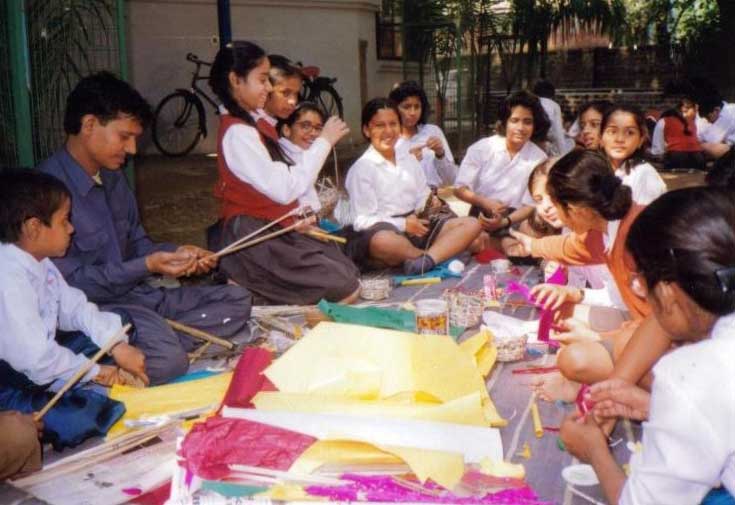
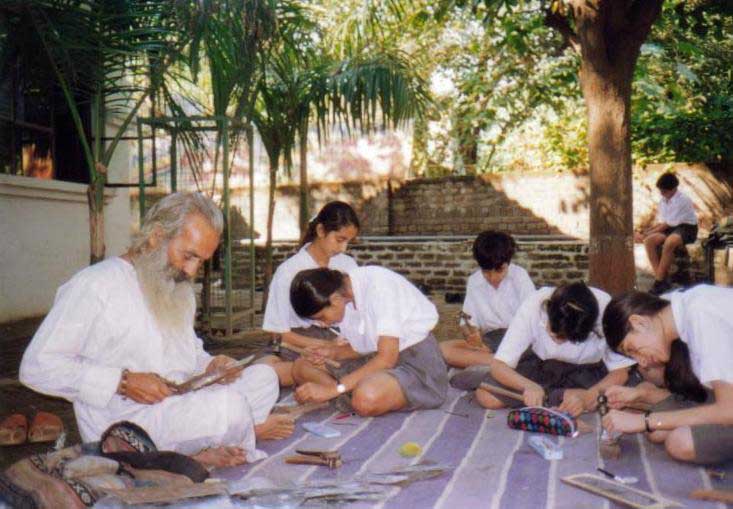
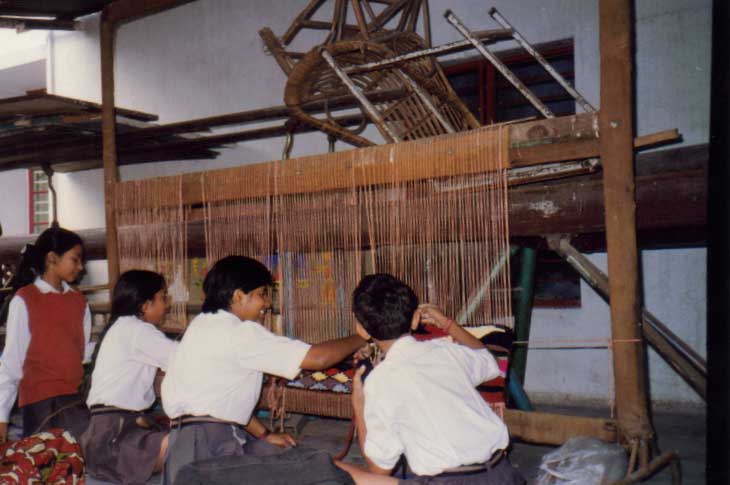
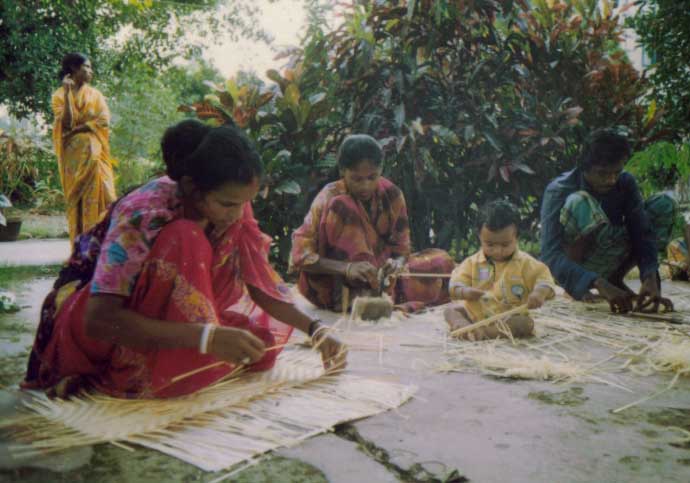
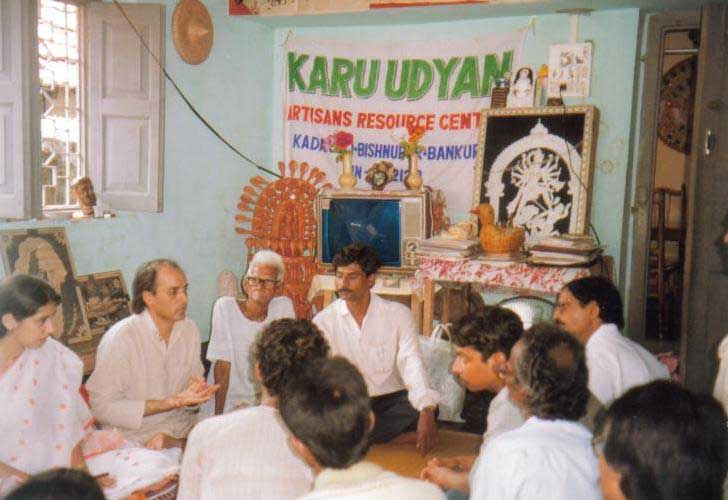
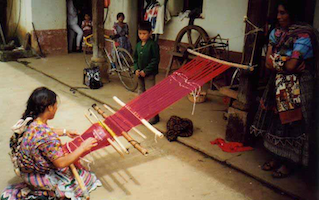
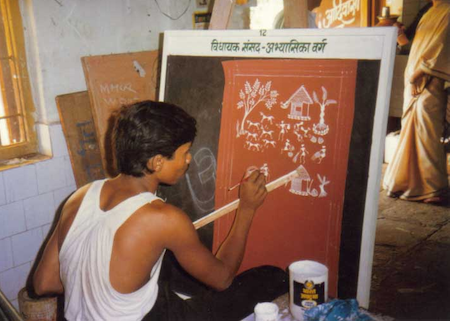
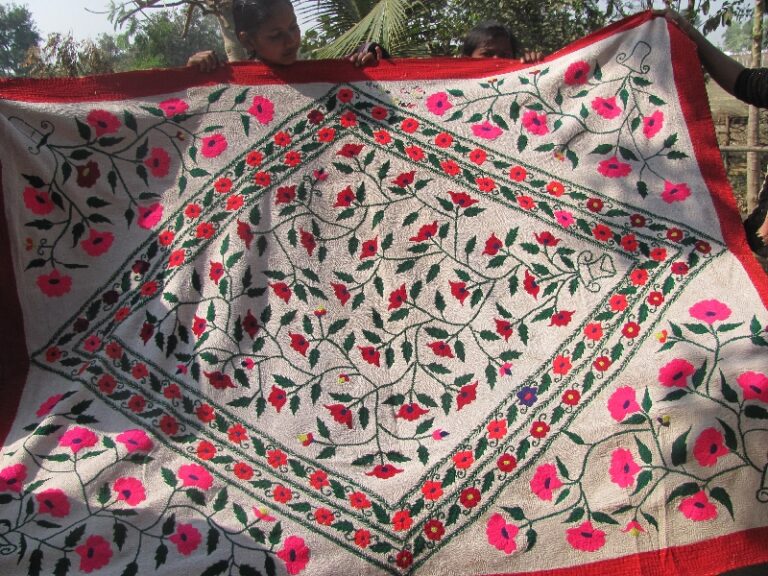
 The ADL project (called Srihaswani in Bengali) broadened the definition of artisan to include many different craft and creative manual skills. Ahimsa Trust also experimented with a grassroots initiative that would build bridges between different communities. An attempt was made to make a self- sufficient artisan organization of about 50 craftspeople living around and in Santiniketan, West Bengal. One such artisan led organisation was set up by the programme in Bishnupur called Karu Udyan. It had artisans from 7 different trades, a difficult feat in a society that has a caste system based on occupations. Since Santiniketan is surrounded by a number of multi-ethnic villages, nine were chosen for this project from different religions including Hindu, Muslim, and Santhal tribal. There were three main objectives of this programme:
The ADL project (called Srihaswani in Bengali) broadened the definition of artisan to include many different craft and creative manual skills. Ahimsa Trust also experimented with a grassroots initiative that would build bridges between different communities. An attempt was made to make a self- sufficient artisan organization of about 50 craftspeople living around and in Santiniketan, West Bengal. One such artisan led organisation was set up by the programme in Bishnupur called Karu Udyan. It had artisans from 7 different trades, a difficult feat in a society that has a caste system based on occupations. Since Santiniketan is surrounded by a number of multi-ethnic villages, nine were chosen for this project from different religions including Hindu, Muslim, and Santhal tribal. There were three main objectives of this programme:
- To develop a fully developed understanding and appreciation of artisan contributions.
- Introduce artisan strengthening measures.
- Identify and create linkages between the grassroots work and a broader socio-political environment thus creating a nurturing framework for artisan contributions.
Based on the experience gained by PADSA, IVPAS was formed to focus on one critical element. It centered around the crucial need to create a global voice for the artisan. IVPAS initiated a trans-national process to make artisans, artisan associations and people working with them in the South connect with sympathetic organizations, friends and volunteers in the North. No matter who they were or where they worked, organizations, policy makers, the corporate sector, multinational companies, financial institutions, the media, anyone who empathized with the cause. This programme was also under the auspices of UNV.



IVPAS worked on the formulation of directions and suggestions for increased international collaboration in the artisan sector to help evolve a viable development alternative through experimental pilot programs, to shift our consciousness. This was done in the fields of media, education, tourism, through research, more efficient organization, legal empowerment and finding newer markets for the artisans creations.
Under the auspices of the UN, and supported by its voluntary arm UNV, the Programme for Artisan development in South Asia or PADSA was a pioneering attempt to bring artisans and all that they and their lives represent into sharp focus. It was an initiative that started in November 1992 at villages located in 4 countries India Nepal Bhutan and Sri Lanka.It emphasized interaction and exchanges between diverse artisans and underlined the importance of the ‘barefoot expert ‘suggesting that artisans themselves could solve the problems of other artisans.
The story of PADSA was published as a chapter entitled “The Art of Building Peace: Artisan Skills for Development and Peace in South Asia” by Shantum Seth, in a book ‘Volunteers against Conflict, published by the United Nations University Press.
A short film was also made entitled ‘Speaking Hands’.


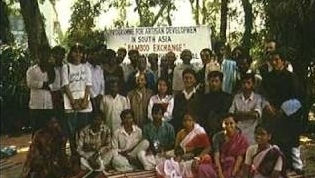

Chandana Dey is the project manager for Srihaswani, or Creative Manual Skills for Self Reliant Development, set in West Bengal. Based in Santiniketan, she is also leading an effort to revitalise Santiniketan. She has worked for UNRISD (United Nations Research Institute for Social Development) in Geneva, Switzerland. She served as Project Coordinator with Ahimsa Trust in West Bengal for the past decade. Chandana has a background in History and International Affairs. Committed to facilitating grassroots development change, she is the co-founder of The Bhab Initiative.
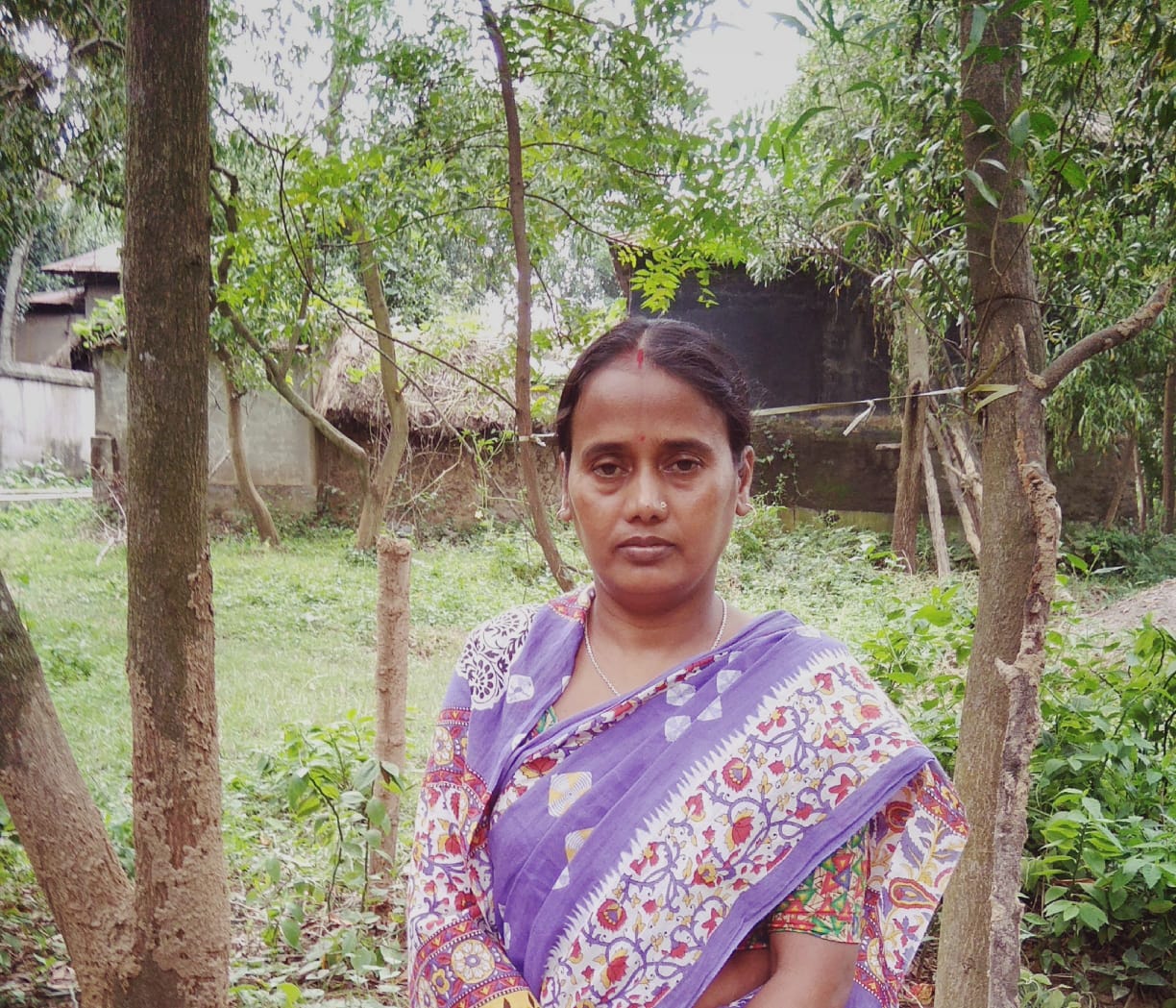
Anuradha Mondal joined the AHIMSA team as a Village-level Facilitator and is now the Supervisor of the Millennium Community Development Project. She has excellent communication skills and leads by example. She started using a smartphone in the middle of 2021 and is able to access media such as the Internet and whatsapp and increase the reach of the Project. She also works with youth groups on COVID awareness and preparedness.
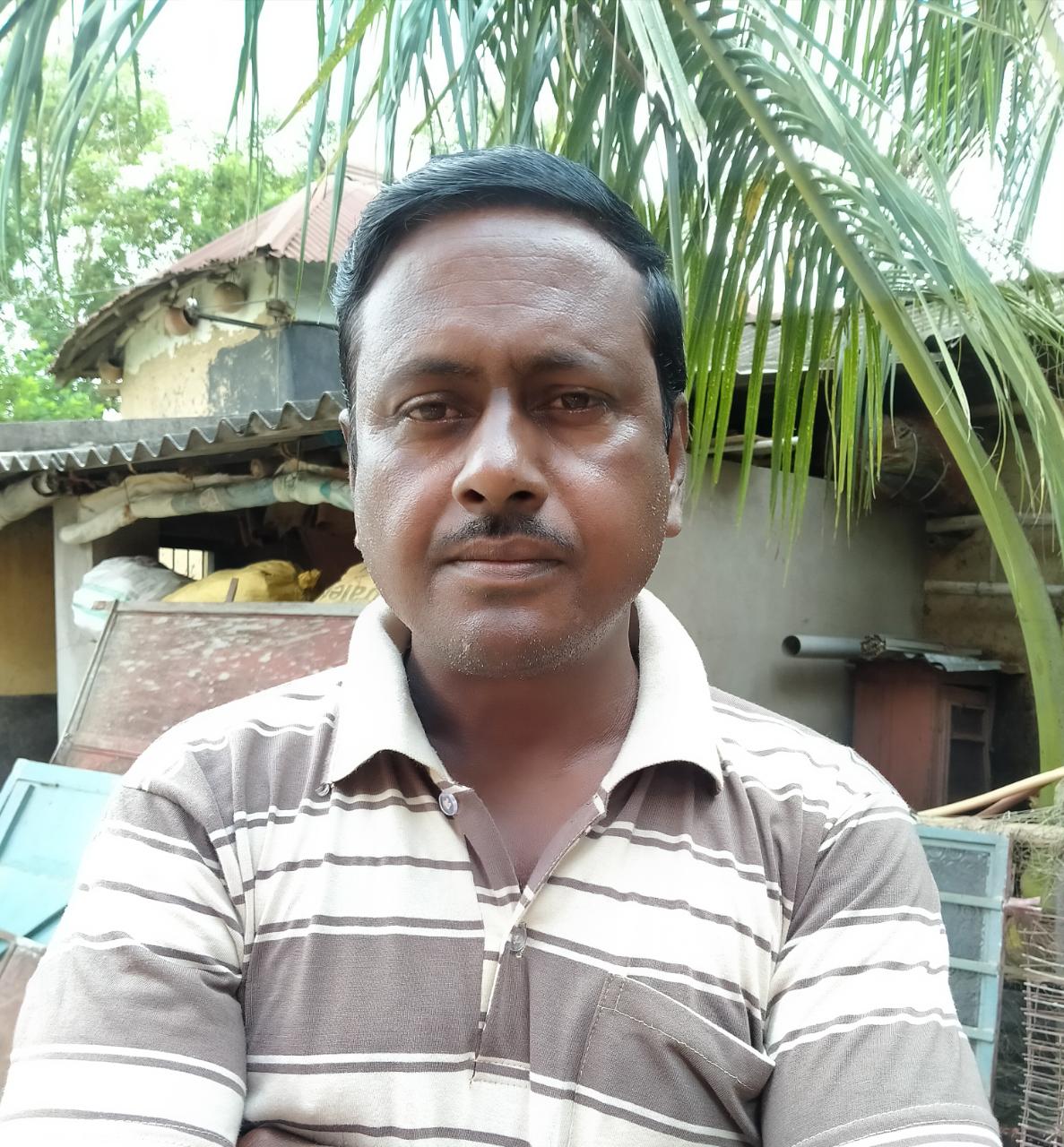
Subhas Das is a farmer with years of experience in sustainable farming. He is an excellent communicator and manages to get on with people from all walks of life. His particular interest in horticulture is evident in AHIMSA’s extensive fruit cropping in the Project villages.

Suchitra Lohar is especially interested in promoting organic kitchen/herbal gardens in villages. Her particular passion is herbal medicine and growing medicinal plants. The AHIMSA kitchen gardeners have all benefited from her extensive practical knowledge and are able to make several herbal medicines from herbs in their gardens.
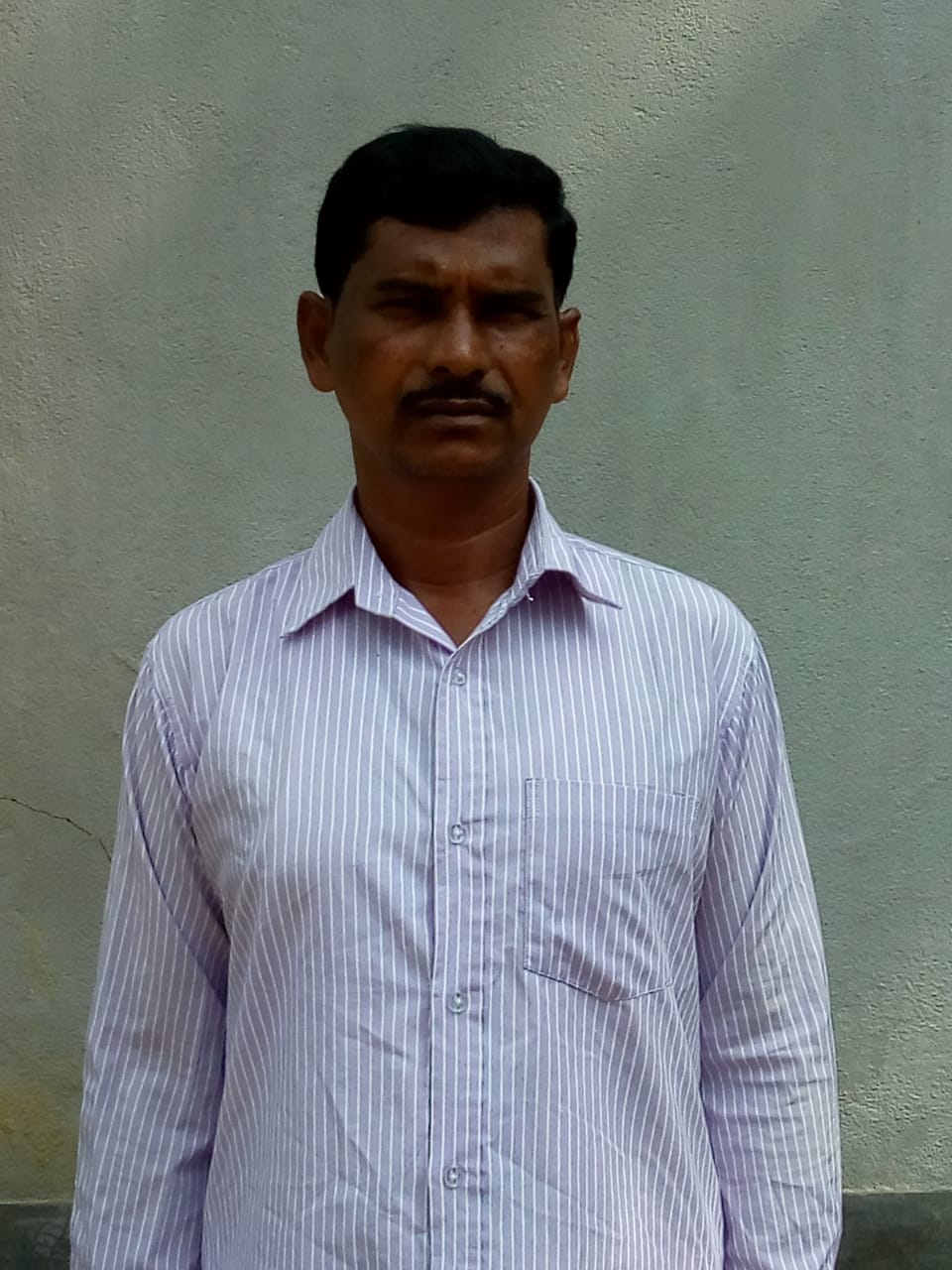
Gupin Kisku has worked as a Village-level Facilitator for a number of years. His deep knowledge of Santal society is invaluable for AHIMSA and his anthropological knowledge is of great interest to all visitors to the Project.
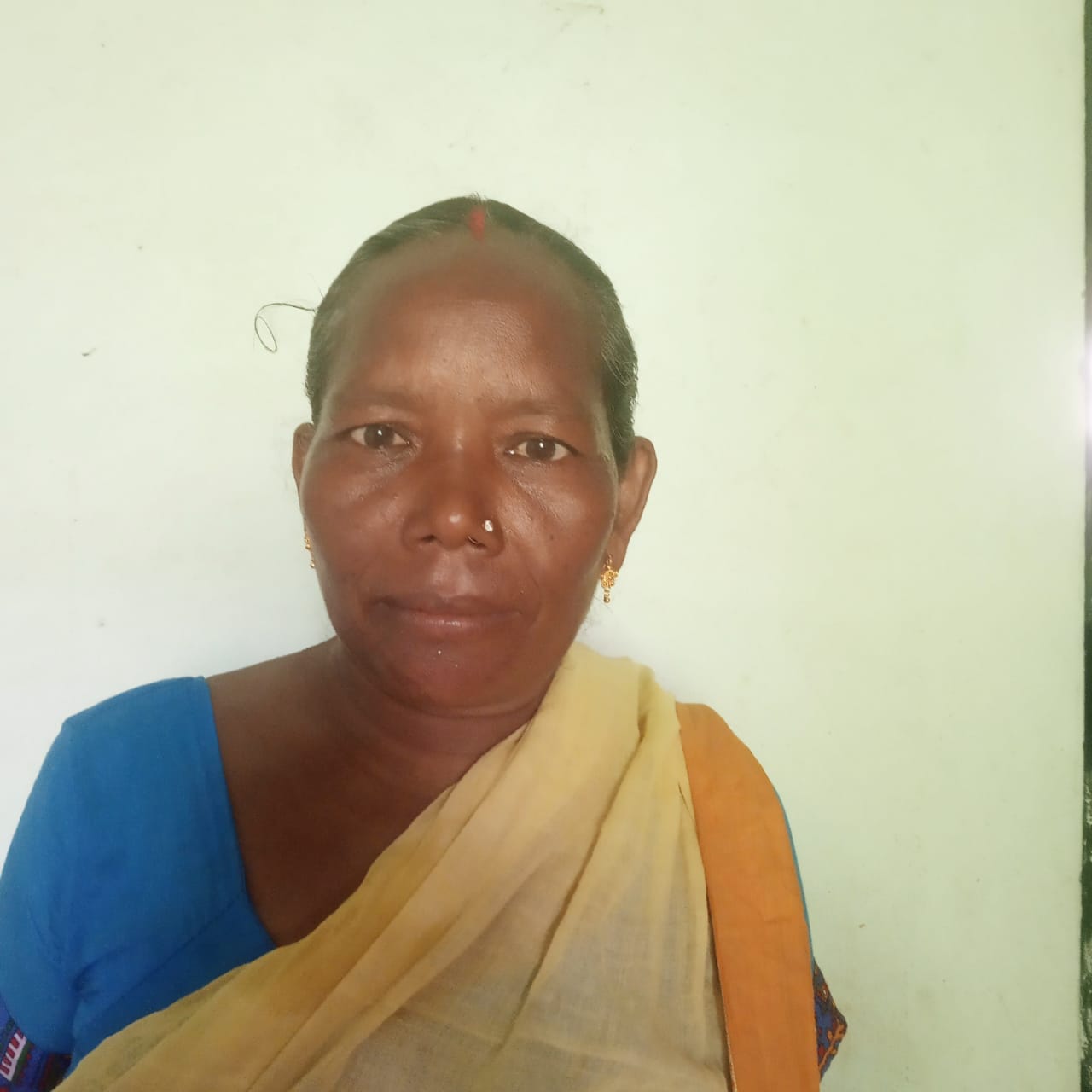
Mungli Murmu used to head the Food Processing Unit that trained several batches of village gardeners in hygiene and food preservation and food processing. She organizes cooking classes in villages and also helps Santal women to maintain kitchen gardens.
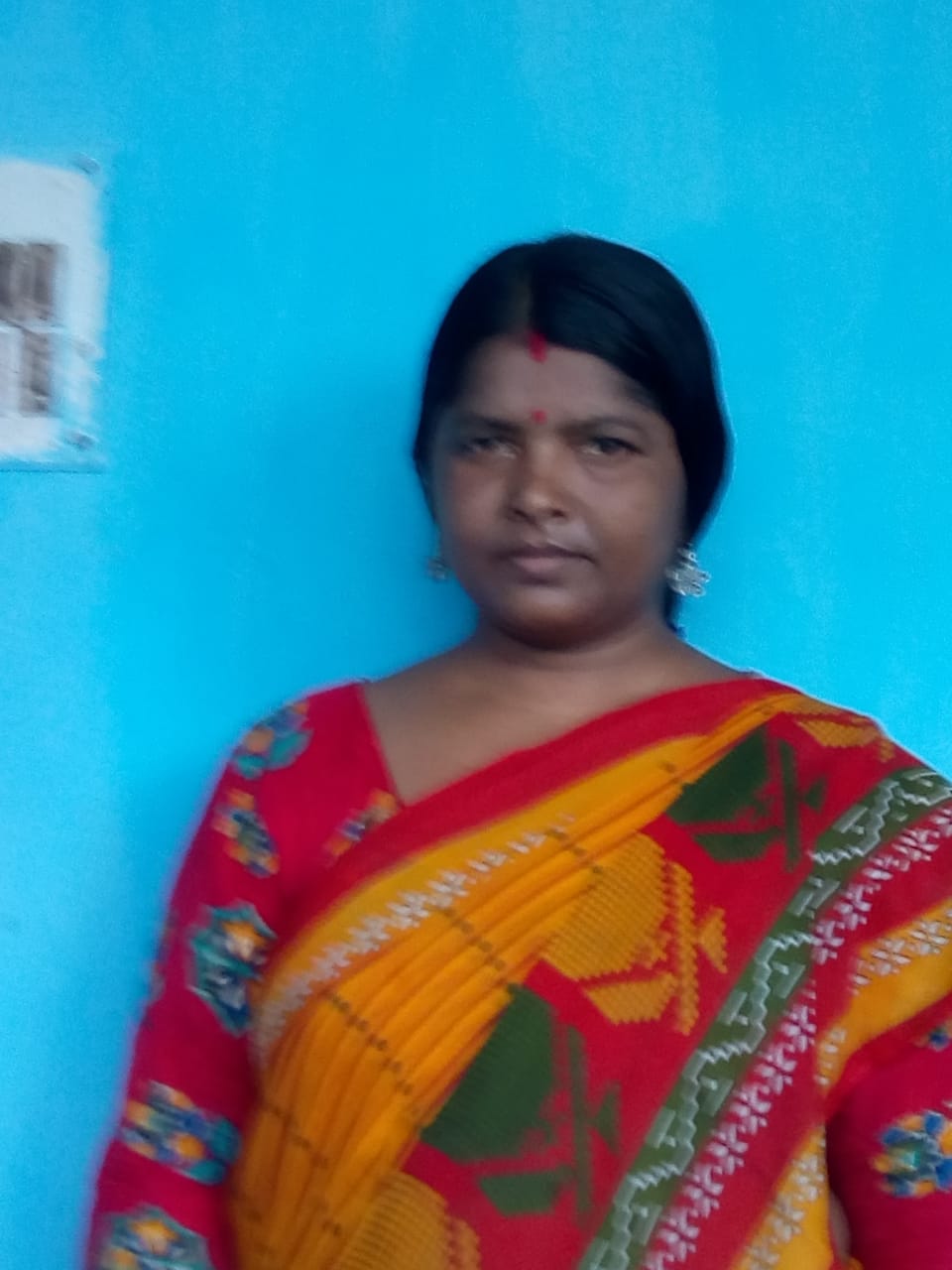
Lakhimoni Kisku is especially interested in children’s health and education. She works in the local Health Centre and knows all the women in the three Santal villages of the AHIMSA Project. She has taken an active part in the COVID programme.
Community Initiatives
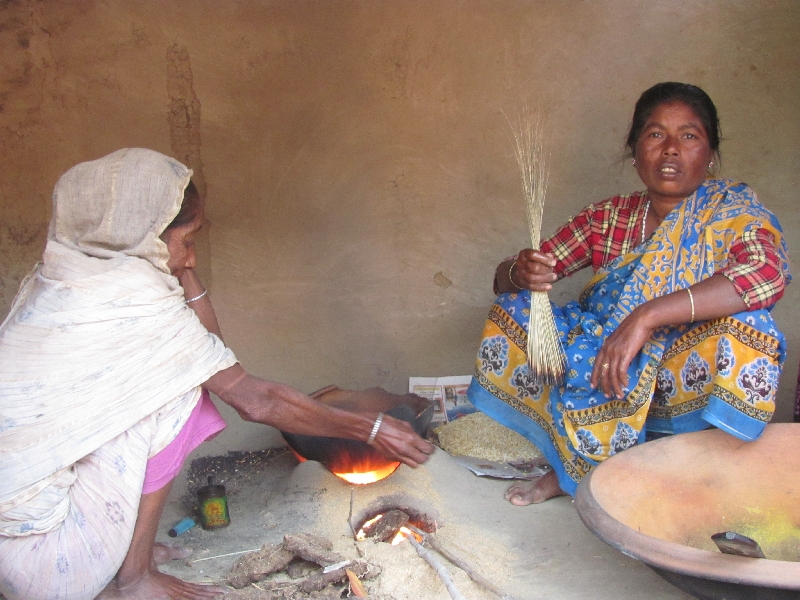
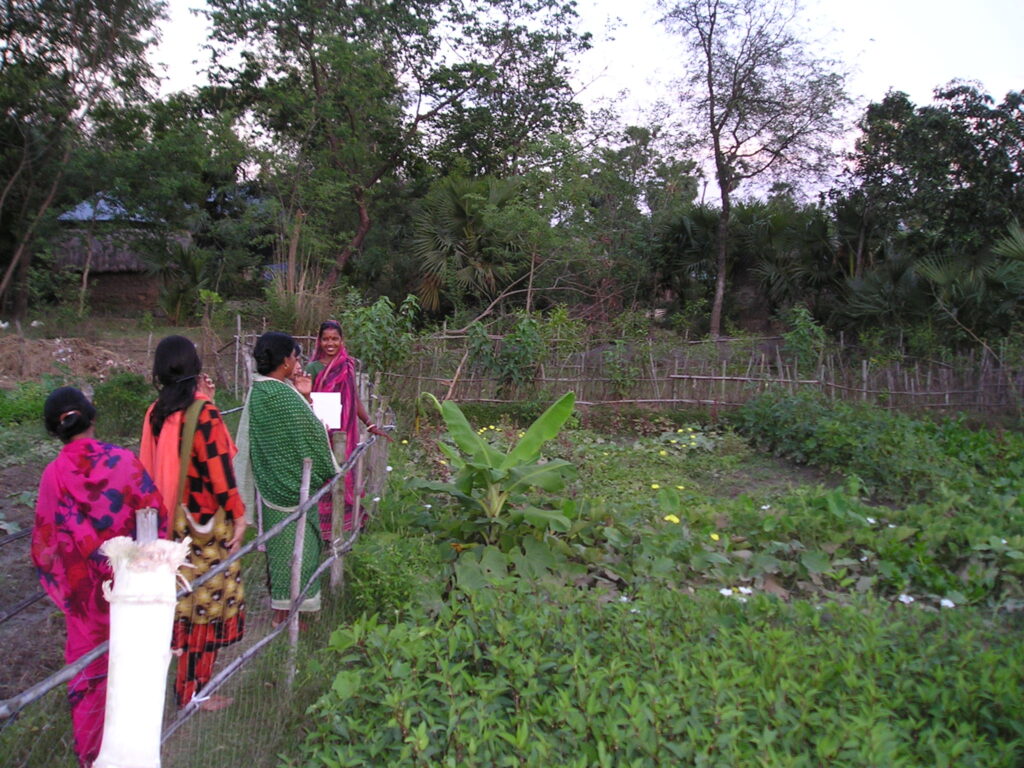
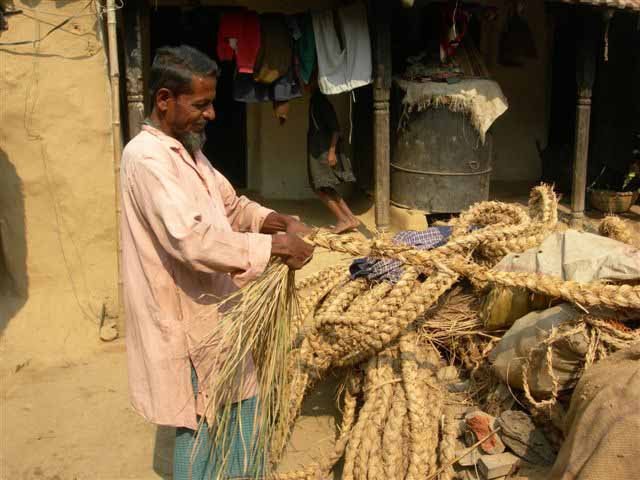
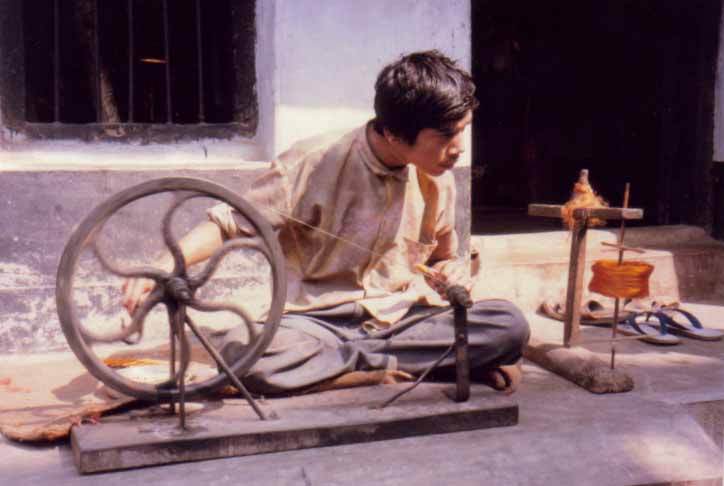
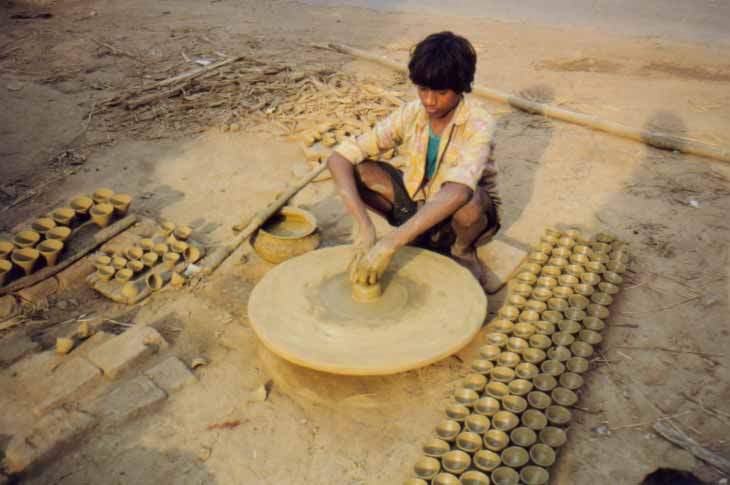






- The first was that the 100 women beneficiaries should become self-sufficient in keeping their own seeds from their vegetable gardens. When we found that the Santal gardeners were unable to keep seeds, we enlisted the help of the older and more experienced gardeners from the Hindu villages to do seed-keeping training.
- A second key objective was to increase the involvement of the Youth Groups in all aspects of our work, especially in horticulture. To this end the Project supplied pots and soil and fertilizer to the members of the Youth Group. Star fruit saplings were planted and each young person was encouraged to nurture their own tree.
- Further intra-village interaction occurred when youth group members visited each other’s villages. The ‘hosts’ took their ‘guests’ around the village and told them of the village history and culture. They then made a local snack for their guests.
- Communications were established with the Oilseeds and Pulses Research Institute, headquartered in Berhampore, in the district of Murshidabad. The Institute supplied the Project team with masoor dal (red lentil) seeds, directly from a farmer cooperative that they supported. Ahimsa women farmers planted this seed, got excellent yields and also kept seeds for the following years.
- Another major achievement was the grassroots research programme headed by Ahimsa Trust Supervisor, Anuradha Mondal. She has encouraged her team to undertake their own research on their smart phones. In 2022 the team members (even the ones who cannot read) took photos and looked at research on youtube. The team members went for weekly sessions at a local cyber café and their research was then printed out by the owner of the café. These were then used to facilitate discussions with the women’s groups.
- 2023 could be called the year of heat waves, drought and pulses. Ahimsa’s team worked hard with men and women farmers to understand the impact of heat waves and the reasons for the long periods of heat (temperatures over 40 degrees) in the months of April and again in June.
- Since paddy could often not be planted due to lack of rain and unseasonal rainfall, Ahimsa held frequent discussions on the need to grow pulses. The health aspects of consuming protein were included in almost every discussion. In addition, local pulses such as ‘gheso matar’, ‘arhar kalai’ and ‘kalo kalai’ require far less water and care than paddy. Yields are good and seed can be kept. Women farmers from Darpashila and Notundanga visited women farmers from the Santal villages to share their experiences and knowledge of pulse cultivation.
- Discussions on GM mustard were held. Most farmers said they had never heard about this form of mustard. Presently the critical judgement of whether GM mustard will be grown in India lies with the Supreme Court of India.
- The Youth Groups conducted an exhaustive survey of each of the 100 families and how many fruit trees they had on their plots.
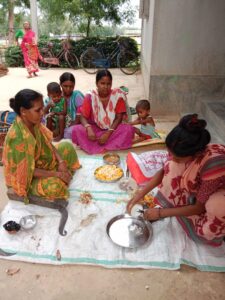
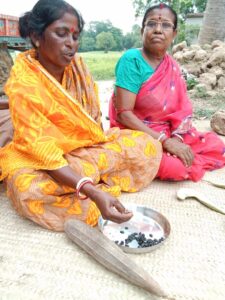

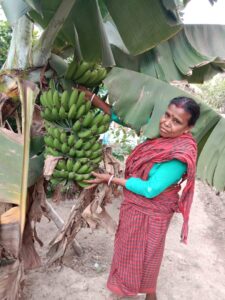
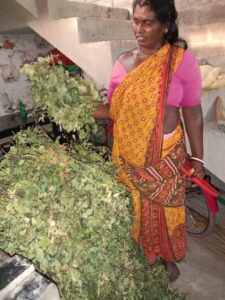

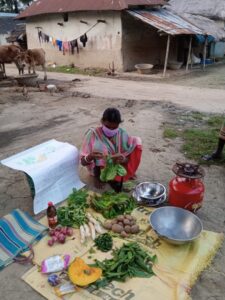
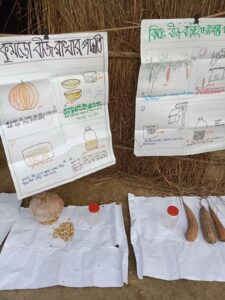
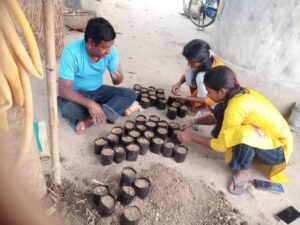
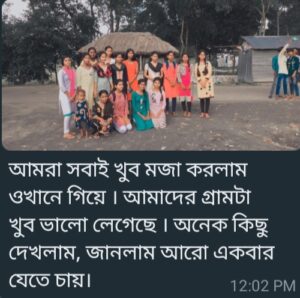
Ahimsa Trust has been active in supporting self-reliant community development in the villages of Birbhum, West Bengal for over two decades. A team of six facilitators, Anuradha Mondal, Gupin Kisku, Lakshmi Kisku, Mungli Murmu, Subhas Das, and Suchitra Lohar, have developed their own skill sets in sustainable farming, herbal medicines, kitchen gardens for nutrition, environment conservation, horticulture, and livestock development. The facilitators live in the project villages and extend training and awareness. Much of the latter is done using pictorial materials.
The work done by Ahimsa in the last twenty years has laid a solid base for any additional work that is especially needed during the Covid pandemic. Ahimsa Trust has empowered farmers to grow their own crops, pulses, and vegetables. Therefore, people are able to maintain a balanced diet and a good immunity to fight against Covid.
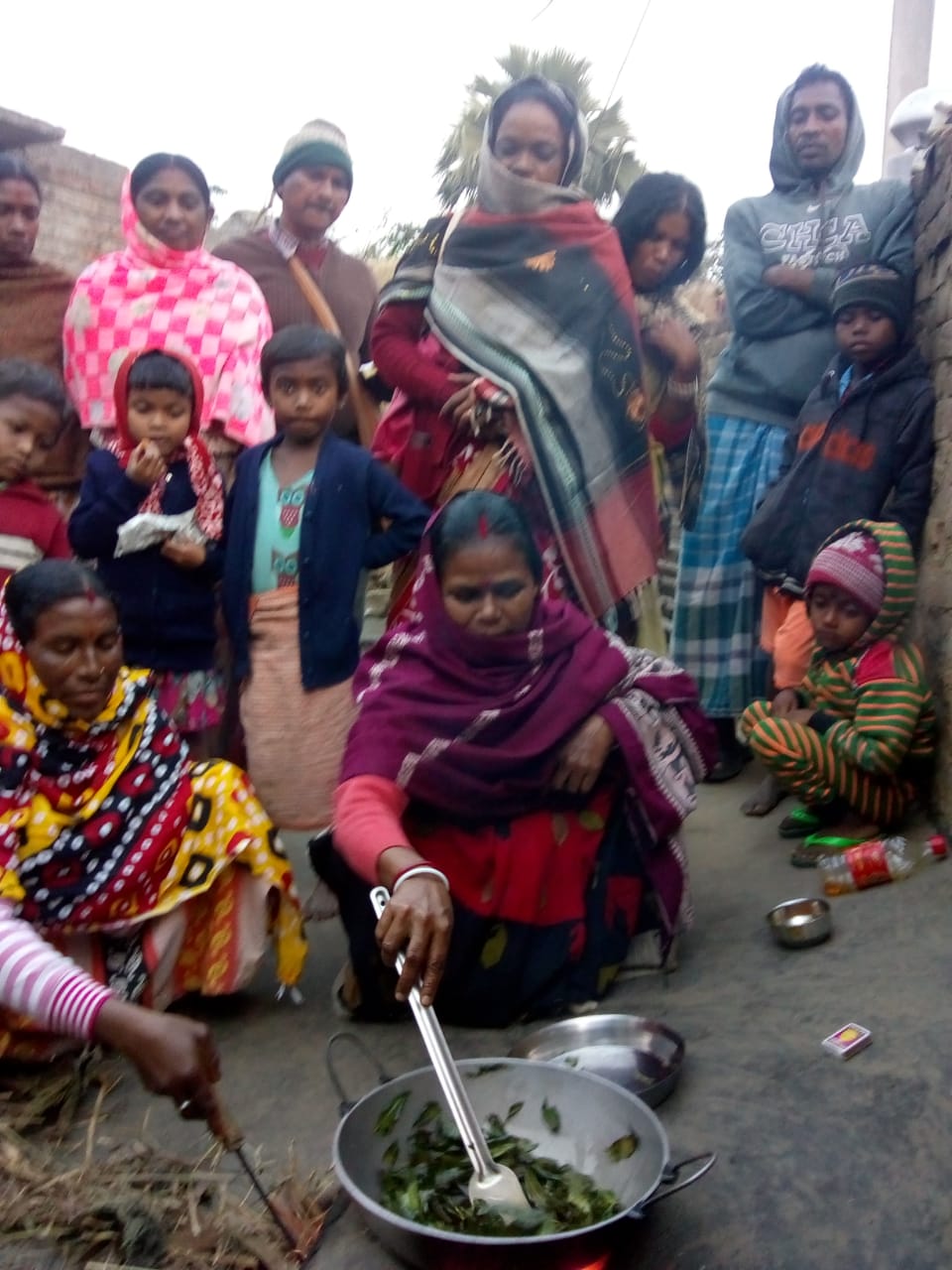
Key Achievements:
- The Vocational Training programmes tried to upgrade existing skills among the community while maintaining the organic natural resource base. The project had a specific gender component to address the needs of young married women, motivate them to improve nutrition, education, and health status of their families while allowing them some room for further emotional and intellectual growth.
- Support for the all-women’s cooperative, Ajoli, that sourced organic fruits and vegetables from kitchen gardens from villages and sold the products in the local market. One of the most popular places for sale was the Saturday Artisans Market.
- Empowered adolescent girls to help others in their immediate neighbourhoods. Besides helping at Home Schools, girls took part in drama workshops, organised surveys, and other village-level facilitation activities.

Key Achievements
- By 2008, over 150 farmers, 200 women kitchen gardeners, and 150 craftspeople received training in organic farming, herbal medicine, nutrition, health awareness, organic all-year kitchen gardens, and craft production and design.
- Started an early childhood learning programme for the Bauri community in the Kendradangal village, the poorest neighbourhood in the nine villages. The aim of this mini-project was to increase the access of the Bauri community to existing government services as well as imparting early childhood care and education (ECCE) for children.
- Worked jointly with the Development Research Communication and Service Centre (DRCSC) to make formal and non-formal education available to all sections in the tribal village of Kayetpukur.
- House to House contact programme to facilitate craft production and kitchen garden extension work catering mainly to Muslim women because of their relative isolation in the home and inability to join community-based groups. In addition, ADL (Srihaswani) enjoys an on-going dialogue on gender and development issues with academics of several Universities including Brandeis and Boston Universities. (Reference: the UNITWIN Blog)
- Environment measures included building low cost toilets with help of the Tagore Society for Rural Development, production of various kinds of organic fertilizer and pesticides, as well as vermin compost production. All fertilizers and pesticides used locally available plants, such as neem and manure. Extensive use of pond soil was also recommended especially in the care of fruit trees.
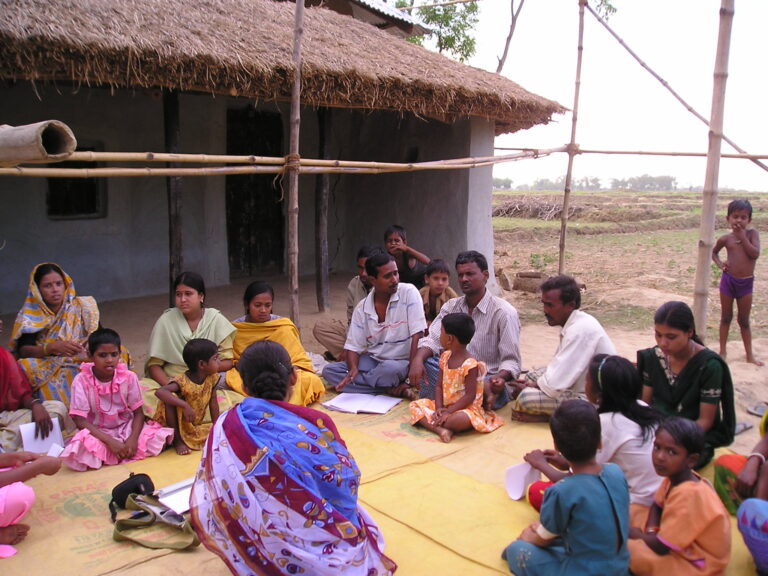
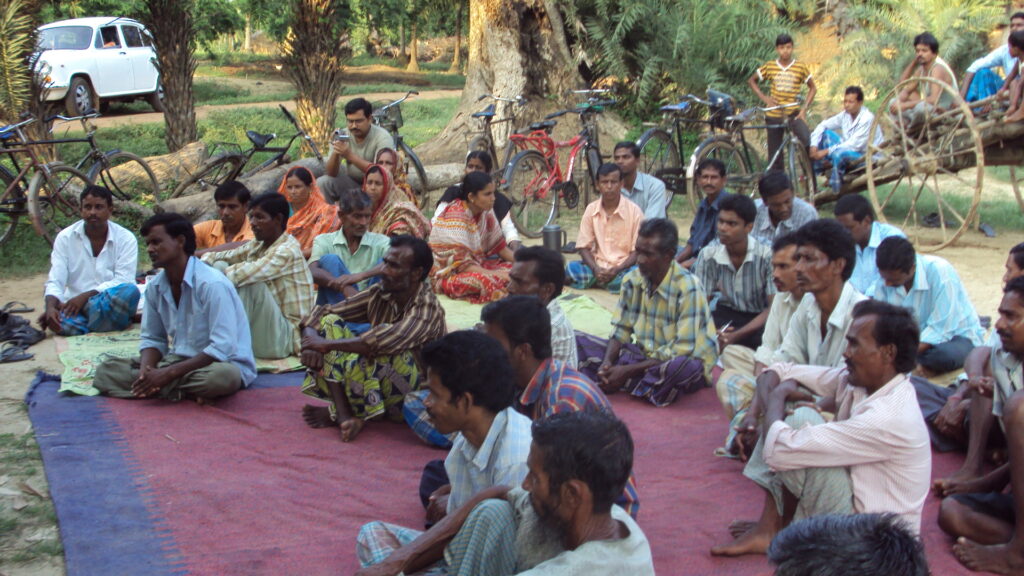
Environment
Ahimsa’s non violent spirit is based on the interdependent nature between us and the environment
Our Sustainable Livelihoods programme’s key participants are the artisans who have been living for centuries in an ecologically sustainable way. The artisan lives and interacts with nature realizing the interdependence between nature and herself. Ahimsa has focused on the environment of the ten villages since the inception of the work.
Key Achievements:
- Farmers have greatly reduced the chemical inputs into agriculture and increased their nitrogenous crops. They have started adopting water saving measures like the system of rice Intensification (SRI) for paddy cultivation. This method also allowed farmers to grow an additional crop after the paddy is harvested. Multi cropping now provides additional food such as lentils, which is an essential protein-rich diet of the villagers.
- Over 200 women had kitchen gardens and orchards where they would get a regular supply of organically-grown seasonal fruit and vegetables through the year. The different varieties of greens provided a much needed source of iron to an iron deficient community.
- The Herbal medicine programme has trained women’s groups in cultivating medicinal plants in their gardens. Women now grow and maintain herbal gardens for treating a range of common illnesses such as stomach disorders, skin ailments, coughs and colds, cuts and bruises, menstrual pain etc.
- The Livestock Development Programme provided cows, goats, hens and ducks to women in six villages of the Birbhum District. These ‘moving banks’ have now multiplied and further livestock is being provided to other families. All the livestock in the six villages were immunized twice yearly. In addition, the team members received training in livestock management.
The vision of Jamun Village, the Mindfulness Practice Centre is to develop an ecologically sustainable space for those who want to live in harmony with the indigenous ecosystem and touch the magic and miracle of inter- dependence. Ahimsa has only planted indigenous trees, plans on giving back to the electric grid via solar, water and wind energy, is developing a comprehensive sewage system through reed beds and other plants so that the water can be recycled and the sludge used as manure, also creating a water harvesting system which will replenish the groundwater and avoid run off soil. We at Ahimsa, would like Jamun Village to be an example of how a community can live in an ecologically sustainable way.
Ahimsa has worked with various partners:
– Focussing on garbage, conducted training workshops for children on how to deal with garbage
– Cleaning the Yamuna river
Besides working in the field of environment, Ahimsa has also worked with the Dalit community, provided medical assistance to people in need, cows have been provided for milk to villagers, toilets built in villages for women etc.
COVID/Health Work
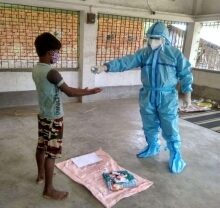





AHIMSA COVID REPORT
Ahimsa Trust would like to thank our donors and volunteers for their contributions and support in helping us with Covid Relief Work. We have just started our work 2 weeks ago and have been working with families and institutions, assisting them in whatever way we can in this difficult time.
Ahimsa is supporting 6 villages in Shantiniketan, as well as communities and organisations in Dehradun, where our Mindfulness Practice Centre, Jamun Village is located. We are also offering retreats and meditation sessions on a regular basis to help with mental health.
Oxygen concentrators, Oximeters, Blood pressure machines, Masks, PPE kits, soap etc have been purchased and dispatched to these places. Some very good work is being done by our volunteers, the photos of which we are sharing. We have a long way to go but with the continued support and good will of our well-wishers, am sure we will get through this crisis together.
Ahimsa has been working with six villages in the Shantiniketan area for the last 20 years in Community Development. Covid has spread very fast in these villages in the last month. There are 400 households in these villages. Our coordinator and 6 member team have started work with 34 households who have been identified to have Covid patients. The local doctor who is helping Ahimsa, Dr. Ganguly has consistently provided medical help in the area. With the help of his team, we have started a medical- contact programme for everyone suffering from a cough, cold and fever. Dr Ganguly has asked that the families of those he is treating also stay home for 2 weeks; a most difficult undertaking since it is now paddy cutting (rice harvesting) time. Our team members are in constant touch with these houses. Each patient is connected to Dr Ganguly, who has a tele-consultation with the patient and prescribes the relevant medicines. Ahimsa has connected with the medical store, Seba, where the patient’s family member collects the prescribed medicines and is reimbursed by Ahimsa funds. There has been constant follow up with the patient and the family by the team. Meanwhile the family has been provided masks and soap and given instructions on how to care for the Covid patient and keep themselves safe as well.
In the past two weeks, we have managed to source 2 oxygen concentrators, along with other essentials like 500 N95 masks, 6 BP machines, 100 PPE Kits, 40 Oximeters, 2500 Surgical masks. These have been sourced through wholesalers and couriered to Shantiniketan. The team is making a little kit with surgical masks, N95 masks and soap with pictorial material developed by volunteers for each household and will be distributing these kits while we write this report.
We have created and compiled pictorial information sheets along Covid related guidelines, in a way that can be easily understood through pictures and the local language. These are on Covid prevention (how to wear masks, social distancing, washing of hands etc.) as well as on how to identify symptoms and deal with Covid patients in the family. Videos are being made on how to use oximeters which can be sent to the patient’s family by phone.
Discussions have been held with village communities to access a common space in the village where those needing oxygen can use the concentrator in hygienic conditions and learn to sterilise after each use.
It has not been easy to coordinate multiple activities, especially due to the lockdown restrictions and the online mode of communication.
Dehradun has experienced a big surge in Covid cases. Ahimsa has extended support to different organisations that are in need of essential items and medical equipment. The first lot of Oxygen Concentrators has arrived in Dehradun. We have provided 50 N95 masks, 500 Surgical masks and 5 Oximeters, which were distributed in a camp organised by Ms. Godavari Thapliyal, a local social worker. Ahimsa has also extended support to Tibetan Primary Healthcare Center along with 5 smaller clinics in Dekliyang Tibetan Colony in Dehradun. They have 386 Covid positive cases in their community and many critical patients in their in patient ward who continuously need oxygen supply.
A week ago they were running out of oxygen and Ahimsa volunteers accessed oxygen through their contacts with the government administration within an hour before they ran out of oxygen for their 19 critical patients. They have requested for nebulizers, concentrators, PPE kits, masks, IV stands, oximeters which we are sourcing Urmila, the Ward Councillor in the Rajpur area too has requested for masks and oximeters which are being sourced and couriered to her. The police in the Rajpur and Roorkee areas has requested oximeters, concentrators, santisers, PPE kits, gloves, masks, flow metres which are being sourced and sent. Mrs Malik, a social worker, who Ahimsa Trust volunteers have known (mother of two daughters who climbed Mt Everest!) is offering free food and Covid prevention materials to remote villages and Ahimsa will be supporting her with materials.
The team in Dehradun is also making similar kits with masks, soap and N 95 masks along with information material in Hindi and have started distributing it to each household in the Chandralok Basti (100 households) where Jamun village is located.
We are putting in efforts every day to source materials as cheaply as possible and get them delivered in a timely manner. It is not without its obstacles, but we are glad to receive outpouring support and help from all those involved in the process.
Some of our team members have been affected by Covid themselves and lost close family and friends. We are extremely grateful to them and their families who are supporting the Ahimsa Covid initiative in spite of many personal responsibilities and bereavements.
We hope with your good wishes and support we can continue to reach out to as many in these most difficult times which India is going through.
Dear Shalini,
Have sent you the photos as requested.
The team members working on the Covid Home Care Project are: Lakhimoni Kisku Murmu (in blue sari)
Mousumi Murmu (standing) Subhas Das (striped shirt)
Lalon Das (volunteer from Notundanga village) Suchitra Lohar (red sari)
Two team members not present were Mungli Murmu (currently in isolation) and Gupin Kisku (has a full time job and therefore unable to give this dedicated time)
My home, Nikot has a large garden. So the team members were able to sitseparately on palm leaf mats (called talai), count the items and then put them into cellophane bags that had been purchased previously.
Once the packets were made and placed in their separate new grocery bags (also bought for the Project), the team was able to understand the use of pulse oximeters. Mousumi Murmu had gone in the interim to purchase the oximeters batteries and the bottles of hand sanitiser.
Each team member placed the batteries in their own oximeter, then placed it on a table- in a clean cloth- and tested their own oxygen levels and wrote the counts down in their exercise books. Three of my team cannot write or read- so this work is done by other team members or their family members.
Such a detailed description was necessary to convey the enormity of the task in front of us with Covid Home Management in rural areas. After today, I’m confident that the team can use the oximeter, so can others in village settings. Tomorrow will be the day to try out the PPE kits.
I am also grateful for Ms Anuradha Mondal who has been coordinating the team effort on her (new) smart phone given by Ahimsa. It took 5 long days for the old number to be registered on the new phone- but this DID get done!
More tomorrow then Warmly,
Chandana
PS The lockdown in Bengal only allows movement and shops open from 7 am to 10 am. I’m afraid lockdown rules were broken today.

